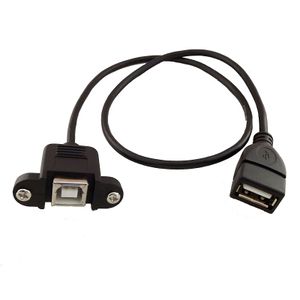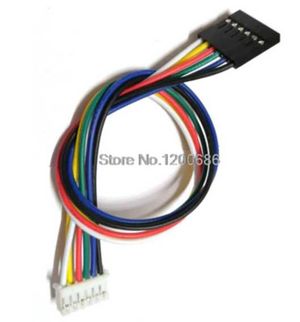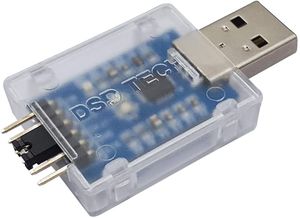Serial TTL Cable and Connectors
After a couple of years of on and off searching, here is the best (so far) method that's been found to conveniently create an external connector for console connectivity to the Linksys WRT / AC Series of Routers.
There were several objectives (beyond the obvious one of provide console access)
- Make it convenient. IE, a USB type B jack similar to most any other USB 2.0 device (printers, scanners, etc.)
- AND have it so the jack looks like it's part of the router instead of a "hack" job.
- Select components that will fit inside of the router chassis
- Try and do it without any soldering needed
Big WARNING
When hooking up all of the below stuff, don't connect any of the power connectors / wires between the Serial / TTL device and the router. Each of them supply their own power. Only the data lines need to be connected. The ground is fine too (but technically isn't a ground, just negative).
The Components
External USB Type B Female Jack / Receptacle
There are several choices available with various connectors and such on the other end, mount types, etc. But the ideal one has a USB Type A Female Jack / Receptacle and a short cable.

As of late 2021 only one vendor was located that was actually still selling the product instead of just listing it and showing it as out of stock: https://www.ebay.com/itm/174285030878(Titled: USB A Female Jack to USB 2.0 B Female Socket Panel Mount Extension Cable)
Another company made a similar one, but has proven impossible to find again (possibly due to all the weird shipping stuff from China in 2021): Cerrxian X001UP6EJB (Description: Cerrxian 50cm Micro USB 5 pin --blurred on lablel-- Screws --blurred on label--)
JST-PH 2.0mm 6 Pin Connector to 2.54 mm "Breadboard" Connector
Keep in mind, not all of the cables will be used. The rest can be removed (and rearranged). The only vendor found was via Ali Express (nothing on eBay, etc.): https://www.aliexpress.com/item/32968403143.html?spm=a2g0s.9042311.0.0.dcd44c4dMgxmS7 (Titled: 20CM 50CM 1M 24AWG JST-PH 2.0mm to Dupont 2.54mm 6P Cable Female black connector wire harness), the 20cm size being sufficiently long.

USB Serial to TTL Adapter
Again, there are lots of choices available. But finding one that will connect the two selected cables reduces the field. That leave several remaining, but smaller is better. And don't get one with a Prolific Serial chipset as those don't play well with Windows 10, etc. (IE, it's an older chipset).

This was the smallest one that came with an enclosure: https://www.amazon.com/gp/product/B072K3Z3TL/ref=ppx_yo_dt_b_asin_title_o00_s00?ie=UTF8&psc=1(Titled: DSD TECH USB to TTL Serial Converter CP2102 with 4 PIN Dupont Cable Compatible with Windows 7,8,10,Linux,Mac OSX ) This one was great too and would have been better, but availability was questionable: https://www.sunrom.com/p/usb-ttl-uart-module-ftdi-ft230x Others like this were small, but didn't have any enclosure (one could get a big piece of shrink wrap and heat it on): https://www.amazon.com/IZOKEE-CP2102-Converter-Adapter-Downloader/dp/B07D6LLX19/ref=sr_1_8?dchild=1&keywords=ttl+serial&qid=1633377342&sr=8-8Yet others were also small, had plastic shielding around the electronics, but used an oddball chipset (will test): https://www.amazon.com/gp/product/B07T1XR9FT/ref=ppx_yo_dt_b_asin_title_o00_s01?ie=UTF8&psc=1
Physical Construction
A hole will need to be cut into the side of the router (left side as one is facing the router is the only viable spot, given the arrangement of internal components. A simple rectangular hole will suffice to slide in the USB Type B connector. The above noted connector will just squeeze in and clear an internal heat sink if mount immediately in front of the antenna on the left side of the router. Remember to make sure to cut the hole far enough away from the antenna to allow for the mounting screw on that side. Also make the hole as close to the top as possible to clear the system board. In some cases, due to sloppy manufacturing, the heatsink on that side might be glued down a bit too close to the side, which will require careful removal and repositioning.